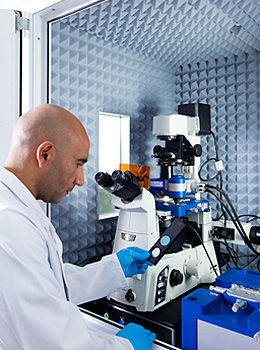06 December 2012
 University of South Australia Acting Vice Chancellor, Professor Joanne Wright, says the University’s plans to develop a wide portfolio of world class research are on target.
University of South Australia Acting Vice Chancellor, Professor Joanne Wright, says the University’s plans to develop a wide portfolio of world class research are on target.
In the second Excellence in Research for Australia (ERA) assessment the University has improved its performance across the board with more than 86 per cent of the research assessed being classified as world standard or above and real gains recorded in fields such as resources engineering and extractive metallurgy, mechanical engineering, information and computer sciences, psychology, human movement and sports science, cultural studies and economics.
“We are making a determined effort to forge an organisational culture that values excellence in research and teaching because we believe building quality on both fronts creates the best kind of learning environment for students,” Prof Wright says.
“ERA is providing a valuable measure of research quality in Australia for industry partners; students and new researchers and we are delighted to see that our results reflect increased excellence at the University.”
Prof Wright says the aspiration for the future of research at the University is to build excellence in areas where it can make a difference to the health and well being of the community and support national goals for economic and social development.
The latest ERA assessment shows that UniSA is performing at or above world class standard in:
- Chemical sciences, including physical chemistry
- Engineering, including electrical and electronic, mechanical, materials, and civil engineering, and resources engineering and extractive metallurgy.
- Mathematical sciences, including applied and pure mathematics.
- Environmental sciences.
- Information computing sciences, including artificial intelligence and image processing, distributed computing and information systems.
- Medical and health sciences, including nursing, human movement and sports science, nutrition and dietetics, clinical sciences, pharmacology and pharmaceutical sciences, medical physiology, and public health and health services.
- Built environment and design, including urban and regional planning.
- Applied economics, business and management, and marketing.
- Studies in human society, including social work, sociology, psychology and cognitive sciences.
- Studies in creative arts and writing, including journalism and professional writing, and visual arts and crafts.
- Language, communication and culture, including cultural studies and linguistics.
- Education systems and curriculum and pedagogy.
The ERA exercise, an Australian Government initiative to assess the research contributions of Australian universities, has been based on research performance data collected between 2005 and 2010.
Prof Wright says the improved results are a coming-of-age for UniSA as it celebrates its 21st birthday.
“We’ve dramatically improved our research performance in the two years since the first ERA assessment and our plans are to continue to target world class quality in all of our research,” she says.
“We’re ambitious about the role that the University will play in building further research excellence and innovation in Australia. In the past five years we doubled our research income and we’re on track to double it again.
“We also want to be sure that the quality research we deliver will add value to society – in health, industry, education and business – we firmly believe university research should make a difference in the world.”
Research highlights and fast facts
- In 2011 UniSA’s total annual research income was $62.5 million.
- To build on existing strengths, UniSA has attracted world-class researchers from institutions such as the Universities of Oxford and Cambridge, the University of London, the Max Planck Institute for Colloids and Interfaces, the University of Melbourne, UC Berkeley and Colorado State University, to establish and build research in key disciplines.
- In 2011, 69 per cent of UniSA academic staff held a doctoral qualification, compared to 64 per cent nationally. UniSA is ranked 7th in the country on the proportion of academic staff with this qualification.
- In the National Health and Medical Research Council grant allocations announced in 2012 UniSA received more funding than it ever had in a single year and the most awarded to a university aged under 25. For the first time it was in the top 10 universities for NHMRC grants.
- In 2011, UniSA was chosen by the Department of Innovation, Industry, Science, Research and Tertiary Education to be the lead agent for the first National Research Network (NRN) project to extend and upgrade the data network linking Australia’s universities and research institutes. Part of the Australian Government’s Super Science (Future Industries) initiative, the $37 million NRN project will ensure the Australian Research and Education Network has the capacity to support future growth in Australian research and innovation.
- UniSA has more than 1200 PhD students, including over 400 international students from 59 countries.
- The majority of these students work in our six research institutes and 17 research centres and engage with a wide range of industry and end user partners.
- UniSA has six research institutes, each with the multidisciplinary capacity to address research questions in a range of priority areas including sustainability, the social and biological determinants of health and Indigenous health, telecommunications, marketing science, materials and mineral science and social science research.
- UniSA is a key partner in 13 Cooperative Research Centres and is now the 2nd highest ranked university in Australia for funding received from Commonwealth grants to Commonwealth’s Cooperative Research Centres.
- UniSA has grown to have the 13th highest research income of Australia’s 39 universities.
- In 2012, UniSA was awarded a five star QS rating for Innovation and a three star rating for research and the specialist discipline 'social science and management'.
- In 2012 UniSA was ranked 23rd in the world for universities under 50 years old (QS - Top 50 under 50).
Media contact: Michèle Nardelli office: 08 8302 0966 mobile: 0418 823 673 email: michele.nardelli@unisa.edu.au



